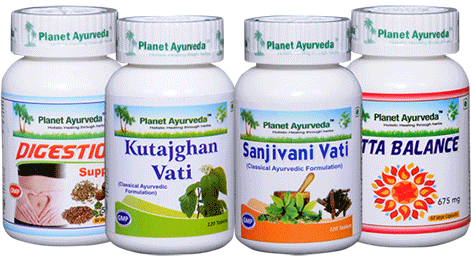Low FODMAP Diet & Herbal Remedies for IBS Treatment
Abstract
Low FODMAP stands for fermentable, oligosaccharides, disaccharides, monosaccharides, polyols which are the short chain of sugar that are poorly digested by the body. They are found in many natural foods and these foods show symptoms like gas, bloating, abdominal pain. This diet is planned for patients who are suffering from IBS (irritable bowel syndrome), SIBO (Small intestinal bacterial growth), and GI Disorder. Is a functional disorder of the small intestine which is followed by altered bowel habits lasting from weeks to months. Stress, anxiety and a hectic schedule plays an important role which worsen the situation. In ayurveda this is similar to grahani. Let’s discuss this in detail!
INTRODUCTION
FODMAPs are short chain carbohydrates and sugar which is poorly digested by the body, as they ferment into large intestines during digestion which produces carbon dioxide, hydrogen, which causes the intestine to expand and produce symptoms like pain and bloating, they are common in patients suffering from IBS. So, they are on a recommended low FODMAP Diet, this is given to patients to heal the gut. IBS causes great distress to patients and they become fatigued. Patients who include a low FODMAP diet may get relief from symptoms such as migraines, fibromyalgia, eczema. Anxiety, stress, and food habits give rise to IBS. In ayurveda it is known as grahani where there is alteration in bowel habits. There is alteration in stools habit; it may be occasionally soft or hard. CLASSIFICATION – IBS D- Where diarrhea is the main symptom, IBS C- With constipation, IBS A- Alternate constipation and diarrhea.

FACTS ABOUT IBS
- Worldwide it is estimated that 5-10% of the population suffers from IBS.
- Mostly it is more common in patients above 50 years.
- 20-40% of patients visiting gastroenterologists are due to IBS.
- IBS is unpredictable, symptoms may vary from person to person.
- Exact cause of IBS is not known but it is due to change in normal bowel movements and its sensation.
CAUSES AS PER AYURVEDA
- Excessive fasting
- Improper food
- Heavy intake of food
- Junk food
- Improper virechana (purgation)
- Grief
- Shock
- Rectal bleeding
- Anemia
- Recurrent
PRODROMAL FEATURES
- Nausea
- Digestion is delayed
- Fatigue
- Bloating
- giddiness
- Gurgling sound in stomach
- Vomiting
On the basis of doshas
- Vataja grahani- Abdominal stools, flatus, headache, chest pain.
- Pittaja grahani- Burning sensation, belching
- Kaphaja grahani- Heaviness is felt on abdomen, mucus is present in stools, sensation of incomplete defecation.
- Sannipatja grahani- Here all the three doshas are involved, so there is lack of concentration, headache, flatus, chest pain.
TESTS FOR IBS
To examine IBS, doctors recommend certain stool tests to check the certainty of infection.
Diagnostic procedure which are followed:
- Colonoscopy
- X-ray, CT scan
- Upper endoscopy
Certain laboratory test
- Lactose intolerance test
- Stool test
- Breath test for bacterial overgrowth.
Treatment of IBS focuses on relieving symptoms
- Avoid food which trigger the symptoms (caffeine, spicy, alcohol)
- Drink more amount of water
- Enough sleep
- More fiber
- Gluten free diet
- Low FODMAP diet is very beneficial
FODMAP DIET
These are carbohydrates which stands for Fermentable, Oligosaccharides, Disaccharides, Monosaccharides, Polyols. Oligosaccharides such as wheat, rye, nuts, legumes, garlic. Disaccharides such as lactose containing products such as milk, yogurt, ice cream. Monosaccharides such as fructose containing foods such as honey, agave. Polyols low calorie sweeteners as in mint. This diet is recommended in patients who suffer from IBS and other digestive problems. FODMAP is found in some food naturally or in fruits and vegetables, are healthy probiotics which help the bacteria to grow in the gut, FODMAP are not digested in the small intestines but they increase the fluid in large intestines. This diet may relieve the problem in people who suffer from IBS. FODMAP is given to improve the symptoms for 4-6 weeks after that it is reintroduced to avoid food identifying the cause, LOW FODMAP is nutritionally balanced.
LIST OF FOODS THAT ARE EFFECTIVE
- Vegetables (carrot, green beans, lettuce, tomato, ginger, olives, turnips).
- Fresh fruits (oranges, grapes, banana, lime, strawberries)
- Soya including tofu, tempeh
- Grains ( rice, oats, corn flour, gluten free pasta).
- Non dairy products- almond milk, rice milk, coconut milk.
- Probiotics are helpful in patients of IBS as bacteria get introduced and show their beneficial effects.
- Seeds as in pumpkin, sesame sunflower seeds.
- Oils such as coconut and olive oil.
AVOIDED DIET
- Some vegetables like onion, garlic, cabbage, broccoli, sweet corn, celery.
- Fruits such as peaches, apricots, mangoes, blackberries.
- Beans and Lentils
- Pasta, Pizza, and various dairy products such as custard, pudding, ice cream, cottage cheese.
- Sweetener such as honey, sorbitol, isomalt (found mainly in cough syrups)
- Drinks such as alcohol, coconut water.
- In patients of IBS some foods are avoided as they alter the function of muscles such as caffeine they cause muscle contractions.
BENEFITS OF LOW FODMAP DIET
It reduces the digestive symptoms – As IBS include stomach pain, bloating and bowel urgency and low fodmap decreases pain and bloating. As there is higher chances that upto 80% relieve stomach pain, manages diarrhea, constipation
Improves quality of life- It improves digestive symptoms as it reduces fatigue, stress and boosts up happiness and vitality.
HOW TO FOLLOW LOW FODMAP DIET
STAGE 1 – Restriction- Patients should avoid high fodmap diet. 75% patients show improvement in 6 weeks and get relief from digestive symptoms.
STAGE 2- Reintroduction- This is reintroducing a high fodmap diet after 6-7 weeks, so that it is easy to find out the people who are sensitive to which carbohydrate or food. The patient is strictly on a low diet for 2-3 days and waits before reintroducing.
STAGE 3 – Personalization – This is a low modified fodmap diet as we restricted some fodmap nuts when reintroduced showed well tolerance . This improves gut health and quality of life.
AYURVEDIC MANAGEMENT
- Regular intake of buttermilk.
- Pomegranate
- Proper sleep
- Fiber rich diet is very useful
Panchkarma plays an important role in IBS as it treats stress and depression such as
SHIRODHARA– This procedure of pouring of medicinal liquid over the forehead is very useful.
PRANAYAM is useful for lifestyle management such as Yoga, moderate exercise, and stress management.
In ayurveda stress is due to imbalance of doshas, so medication, massage, aromatherapy is helping to reduce the symptoms of IBS.
SOME OF THE DRUGS USED IN IBS
1. Turmeric
Turmeric is a great medicine for digestion, abdominal pain, and bloating. It has the property of anti-inflammatory and antioxidant agents. Turmeric is used to retard the facial hair growth as it is applied over face for 15 minutes and than remove it. Haridra has ushna veerya so it enables free circulations and nutrients to every cell of the body. It removes the blocked channels which are created by pitta dosha and kapha dosha.
2. Plantago Psyllium
Commonly known as isabgol a high rich fiber diet used for treatment in piles, constipation, herpes, distension of abdomen. Psyllium has madhur (sweet) taste, snigdha (moisture) guna, sheetal veerya and it reduces vata dosha. Isabgol acts against constipation by trapping the water in the colon and acts as a laxative.
HERBAL REMEDIES FOR IBS BY PLANET AYURVEDA
Planet ayurveda is one of the certified companies which formulates their own herbal products for managing health concerns. The products formulated here are free from any preservatives, color, and any synthetic material. The herbal products prepared here are free from any side effects and are totally safe made under strict guidance of the managing team. For the purpose of IBS, planet Ayurveda provides an IBS PACK we are going to discuss here.

IBS CARE PACK
1. Pitta Balance
It is the formulation of planet ayurveda containing Jahar Mohra pishti (natural calcium compound), Akik pishti (natural calcium compound), Giloy (Tinospora cordifolia). Pitta imbalances produce symptoms mainly in the stomach and intestines. Ghee mitigates pitta and increases digestion strength. Purgation therapy targets the small intestines which is the main site of pitta. Consuming milk decreases pitta dosha as it is a natural coolant.
Dosage– 1 capsule twice daily with plain water after meals
2. Kutajghan vati
Kutajghan vati is found in the forms of tablets, which helps to maintain healthy digestive system, supports intestines, this herb is free from any preservatives, colors, fillers and one of the formulations of planet ayurveda which contains Kutaja (Holarrhena antidysenterica). Kutaj is a potent herb used as stanya shodhana, asthapanopaga, and a very good drug to cure atisara, pravahika.
Dosage– 1-2 tablets twice daily with lukewarm water.
3. Digestion Support
Digestion support is herbal formulation without any chemicals, is a blend of unique herbs which are helpful in the digestive system, maintaining the pH in the stomach. This is one of the formulations of planet ayurveda which mainly has Amla (Emblica officinalis), Haritaki ( Terminalia chebula), Dhania (Coriander sativum) and many more. Amla is one of the useful herbs which has rejuvenate properties, Haritaki is a useful herb for relieving gas as it suppresses the formation of gas and acts as a mild laxative.
Dosage– 1 capsule twice daily with warm water after meals.
4. Sanjivani vati
This is One of the formulations which is found in the form of tablets and used by acharya in ancient times for treatment of many diseases. It is formulated by planet Ayurveda which consists of Vidanga (Embelia ribes), Pippali ( Piper longum), Vacha (Acorus calamus),and many more. Sanjivani vati is commonly known as amrit vati. Sanjivani vati is a powerful herb which cures aam and balances vata and kapha dosha and increases metabolic fire and burns out fats and toxins from the body. Sanjeevani vati acts as an antivenom and antitoxin drug.
Dosage– 1-2 tablets twice daily with lukewarm water.
CONCLUSION
Here we studied IBS (irritable bowel syndrome) which is a functional disorder of the small intestines which is characterized by abdominal pain, bloating, and altered bowel habits. Is a functional disorder of the digestive system leaving patients in stress and fatigue. Here we discussed types, causes, and about ayurvedic management of this disease and diet which is consumed in the IBS (low fodmap) diet and many herbal remedies which are formulated by planet ayurveda (IBS care pack) which provides much relief to patients .



